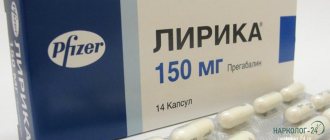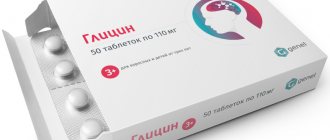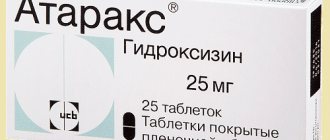Anonymously
Around the clock
Attention! The material contains information about substances, the use of which can cause serious harm to your health!
Pharmacy drug or medicinal product? These are the kinds of debates that are constantly going on about certain drugs that are widely used in the treatment of certain diseases, but at the same time are successfully used by drug addicts to get a high. First you need to figure out what “Lyrics” is.
- Lyrica tablets - what is it, effect, active ingredient
- What does the drug Lyrica look like, photo
- Lyrica action, instructions
- Ways to use Lyrica
- Drug effect
- Pregabalin
- Symptoms of drug use - how to understand that a person is on Lyrica
- Eyes are the main feature
- Side effects from Lyrica
- How does it affect potency?
- How addiction is formed
- Is it possible to die from Lyrica?
- Alcohol compatibility
- Lyrica Test
- Medical therapy
We will select an individual treatment plan
Free consultation 8-800-200-27-23
Lyrica tablets - what is it, effect, active ingredient
The drug was originally prescribed as a medicine to treat epilepsy. It has an anticonvulsant effect, giving the same effect as antidepressants. Widely used in addiction medicine to relieve withdrawal symptoms. Alas, Lyrica pills for getting high will quickly lead a person to an impressive list of side effects. Since 2012, the drug has been sold only by prescription precisely because of the increased number of Lyrica drug addicts.
What does the drug Lyrica look like (photo)
The medicine is an oblong gelatin capsule of red and white color.
Photo of Lyrica tablets
The price of these tablets is relatively low, so the drug “lyra” has gained even more popularity among pharmacy drug addicts.
Lyrica action, instructions
The product contains pregabalin - this active substance affects opioid receptors in the human brain. As a result, pain is reduced and there is an anticonvulsant effect. The medicine has proven itself in the treatment of generalized anxiety symptoms. Analogues of the drug contain substances similar in action, for example, Algerica, Gabana.
Lyrica's instructions indicate doses for the treatment of certain diseases - from 150 to 600 mg per day. In addition, withdrawal from the drug should be gradual - the dose is reduced daily. After stopping the medication, reactions such as nausea, depression, excessive sweating, chills and lack of appetite are possible.
HOW TO HELP A DRUG ADDICT IF HE DOESN'T WANT TO BE TREATED
Ways to use Lyrica
The harm from lyrics is further aggravated by the method of administration. Drug addicts practice several methods of use:
- together with alcohol, which greatly accelerates the destruction of the liver and kidneys;
- standard oral administration without dosage control and diet causes disruption of the gastrointestinal tract;
- Some drug addicts believe that if the drug is inhaled, the rush will increase. Perhaps such an effect is present, but at the same time the respiratory tract is affected, and the risk of spasms increases;
- Parenteral administration (intravenously) is dangerous due to the occurrence of sepsis, transmission of HIV and hepatitis, and the likelihood of blood clots increases many times over.
Even short-term use of the medicine (including under the supervision of a doctor) can be addictive.
Drug effect
The effect of the drug "Lyra" is similar to the effect of heroin - a person feels euphoria, relaxation, and bliss. Some people experience a surge of strength and extraordinary love for everyone around them.
Fig.: Preparing the lyrics
Pregabalin
This substance is a synthetic substitute, a synthetic analogue of gamma-aminobutyric acid. Absorption is quite fast, which is what drug addicts take advantage of. In addition, pregabalin is not detected by standard tests; it can only be detected by chemical and toxicological analysis of human biomaterial.
Medicine Lyrica: instructions for use and price
Below we will discuss instructions for use and reviews of Lyrica tablets.
The drug is used orally in a dosage of 150 to 600 mg per day, this amount is divided into 2-3 doses.
Lyrica 75 mg: instructions for neuropathic pain. The drug is started at a dosage of 150 mg per day. After about a week, the daily dose can be increased to 300 mg. After another 7 days, the dose can be increased to a maximum of 600 mg per day.
Lyrica 300: instructions for epilepsy. Treatment begins with a daily dosage of 150 mg. The doctor constantly monitors the patient’s condition and, depending on the effectiveness of the drug, may increase the dose after a week to 300 mg per day. After another week, the maximum dosage may be prescribed - 600 mg per day.
Instructions for the drug Lyrica for fibromyalgia. Reception can be started with a daily dose of 75-150 mg. After a week, the dose can be increased to 300 mg, then, if necessary, to 450 and 600 mg.
Lyrica capsules: instructions for increased anxiety. Dosages of the drug are similar to those in the treatment of other pathological conditions. Reception begins with 150 mg per day, then the dosage can be increased.
How to take lyrica correctly? The drug can be taken regardless of meals, before or after. The capsule must be taken with a sufficient amount of water. If, after the patient has started using Lyrica, it needs to be discontinued, then this must be done with a gradual dose reduction over the course of a week.
Symptoms of drug use - how to understand that a person is on Lyrica
How to recognize a person who uses this drug for a high? Most often you will notice empty Lyrica packs in the trash can or pockets. At the same time, the drug addict believes that he will not be exposed, because this is medicine. This is a complete lie - the drug is not sold without a doctor’s prescription, and for this there must be serious indications for use. Other signs include:
- absent-mindedness, the addict periodically completely “disconnects” from the world around him”;
- a person may stagger, he cannot control his body even when walking normally;
- frequent mood swings from laughter to deep depression, and all this alternates;
- heavy sweating with a strong unpleasant odor;
- slurred speech.
Eyes are the main feature
The most important sign of drug intoxication is the eyes. When using Lyrica, you can see dilated pupils that do not react to light, your eyes do not focus and constantly run around.
Sometimes the opposite effect is observed - the eyes become glassy and practically do not move even when communicating. Anyone who has ever seen a drug addict will understand what it looks like. There is a possibility of severe redness of the whites of the eyes.
Fig.: Eyes of a drug addict under the lyrics
Where to buy Lyrica tablets in Moscow?
This drug can be purchased in almost any pharmacy chain in the capital. But Lyrica tablets are sold in pharmacies with a prescription. This drug is strictly prescribed, as it affects the nervous system and, if used incorrectly and self-medicated, can cause significant side effects and negative health consequences.
Want to know where to buy lyrics? You can find on the Internet all the necessary information about pharmacies, the availability of this drug in them, and its cost.
drug addictionmedicines
Side effects from Lyrica
Like any other drug, Lyrica has an impressive list of side effects: tremors of the limbs, nausea, vomiting, insomnia, increased sweating, hallucinations, dry mucous membranes, bloating, lack of sexual desire and erection. Due to frequent diarrhea, it is possible to wash out all useful substances from the body, in particular calcium, which threatens osteoporosis.
Memory lapses, so common to many drug addicts, are also relevant when taking Lyrica. A person may not remember what happened an hour or a day ago.
How does it affect potency?
As mentioned above, the drug almost completely eliminates libido. At the same time, problems with potency may not be solved even after stopping taking Lyrica. There are known cases of infertility.
How addiction is formed
The addiction to the drug forms unnoticed by the user - the first doses only bring a feeling of high. Next, the body begins to adapt to the active substance and requires increasingly larger dosages to return to the original sensations. Often, an increase in the amount of Lyrica can cause a sharp change in mood and causeless aggression even towards close people. There are known cases of suicide under the influence of the drug.
Find out treatment recommendations without leaving home for free
To select a treatment plan, you just need to leave a request, we will contact you to select the time and specialist you need
Submit your application
Withdrawal from Lyrica - symptoms
Withdrawal in lyric drug addicts occurs when they try to stop taking the drug or simply cannot get their next dose. Symptoms of withdrawal from Lyrica are as follows:
Pain and discomfort in the stomach. The patient experiences constipation/diarrhea, heartburn, and intestinal colic. Often because of this he cannot eat normally.- Difficulty breathing. The lungs, under the influence of the drug, begin to work less efficiently. This results in shortness of breath, a feeling of lack of oxygen, even when a person is in a well-ventilated room or outdoors.
- A sharp increase or decrease in blood pressure. It is fraught with hypotension, hypertensive crisis and all the ensuing consequences.
- Increased levels of aggression and anxiety. The patient is nervous and cannot calm down. Any little thing makes him angry. At the same time, he is not able to explain to others why he is angry, what worries him.
- Very severe pain in muscles and joints. The drug addict feels as if his bones are being broken, his muscles are being torn. These feelings are unbearable. That is why patients are ready to do anything to get the next dose.
Loss of consciousness, frequent fainting. Happens at any moment.- Decreased visual acuity and hearing. This is typical even for young people.
- Inflammatory rashes on the skin. They go by very slowly.
- Increased sweating. Sweat continues to be actively released, even if the drug addict sits or lies quietly.
But perhaps the most dangerous symptom of withdrawal from Lyrica is falling into a coma. The fact is that not all drug addicts manage to recover from this - some die, despite the efforts of doctors.
Is it possible to die from Lyrica?
This medicine, at an adequate dosage prescribed by a doctor for the treatment of certain diseases, is not capable of causing death. But drug addicts most often combine Lyrica with other drugs or alcohol, and also do not control the number of pills. In this case, an overdose occurs and the corresponding phenomena are vomiting, diarrhea, confusion and coma.
If a drug addict has heart or kidney problems (and almost 80 percent of drug users have them), then death from an overdose is also possible. It is worth noting that such cases occur when taking Lyrica for a sufficiently long time. The lethal dose of a drug is individual for everyone, it all depends on the duration of use and the condition of the body as a whole.
DOTOXIFICATION
Consequences of using Lyrica
An extensive list of contraindications and side effects makes it necessary to sell Lyrica and similar antidepressants strictly by prescription. Dependence on this substance leads to severe intoxication, overdose and even death.
Harm of Pregabalin
Pregabalin is often taken by teenagers in groups because of the narcotic effect. Even taking the drug for medical purposes often leads to the development of adverse reactions that require timely and comprehensive intervention.
One of the most insidious effects of taking Lyrica is the development of apathy and impaired attention. This means that the drug addict simply will not notice the rapidly developing disease, and, therefore, will ignore the need for treatment. Often, such people turn to medical organizations only in serious condition: their lives are in great danger.
What will Lyrica do for the body?
Long-term use of antiepileptic drugs contributes to the development of severe intoxication. The liver cannot cope with such a load, since it is the liver that is responsible for neutralizing the poisons entering our body. As a result, liver cells are affected, cirrhosis and other diseases develop.
Taking the drug often causes serious reproductive diseases in girls. The development of cysts and oncology is possible, and the chance of ectopic pregnancy and infertility increases.
How does it affect potency?
Dependence on Pregabalin has a “chemical castration” effect. The first time after taking the medication, there is an increase in potency and libido, but over time this effect begins to subside. A man loses interest in sex life, becomes apathetic and uninteresting. Over time, impotence develops, which cannot be cured even with stimulant drugs.
Alcohol compatibility
Drug addicts often combine alcohol and Lyrica. This is done to enhance the effect. Such a tandem is doubly dangerous:
- alcohol reduces the breakdown and release of pregabalin, which can result in severe intoxication of the body;
- the combination of medication and alcohol can cause powerful disturbances of consciousness and hallucinations.
Everything also depends on the concentration and strength of alcoholic beverages, as well as on the dosage of the medicine. In large quantities, this combination can cause mental disorder.
Lyrica Test
It was already mentioned above that this drug is not detected by standard urine and blood tests. These tests are designed to detect marijuana, heroin, cocaine and other drugs. It is possible to conduct a chemical and toxicological examination. However, the medicine does not belong to the list of narcotic substances.
Medical therapy
Treatment for a drug addict taking Lyrica is virtually no different from therapy for a heroin and other drug user. It can be roughly divided into two stages:
- removing the drug from the body, cleansing it, replenishing the lack of fluid;
- further therapy, including withdrawal symptoms, drug treatment, and psychological rehabilitation.
After the drug is removed from the body and withdrawal symptoms are eliminated, it is important to conduct a comprehensive examination. This will allow you to understand what you need to pay attention to. Most often, drug addicts suffer from liver, kidneys and heart.
DRUG ADDICTION TREATMENT IN MOSCOW
The most difficult stage is not physiological, but psychological - the drug can be easily removed from the blood, but it is very difficult to remove it from consciousness. Psychotherapy is mandatory for all patients. Sessions with a specialist or in a group will help to cope with a person’s internal problems, which often lead to drugs.
Leave a request for a free consultation with a specialist
We will contact you as soon as possible
- — Anonymous
- - For free
- — Around the clock
Another difficulty is returning to normal life, because outside the clinic the likelihood of buying a drug is at every turn. It is best to continue psychotherapy sessions for an addicted person regularly throughout life. They are also necessary for family and friends - often parents, husbands, wives, brothers or sisters become codependent and do not know how to behave correctly.
Article prepared by an expert
Terekhova Anna Vladimirovna
psychologist-consultant on socio-psychological work with addicted clients and their families. More than 9 years of experience.
Similar articles:
Withdrawal syndrome: how to quickly help an addict
21 recommendations on how to deal with an addict during the recovery process
Why can't you completely control a drug addict?
How to help a drug addict with an overdose?
Cocaine and alcohol
to ““Lyrics - a drug or a medicine?””
- Yaroslav:
November 20, 2021 at 09:21
The drug Lyrica is nothing more than a medicine used to combat pain and cramps. To be precise, Pregabalin, also known as Lyrica, is an antiepileptic drug. It is a strong pain reliever.
Answer
- Lyubov Uspenskaya:
November 27, 2021 at 06:30
The pregabalin molecule, being an analogue of GABA, binds to the additional subunit (?2?) of voltage-gated calcium channels in the central nervous system, which contributes to the manifestation of analgesic and anticonvulsant effects. A decrease in seizure frequency begins within the first week.
Answer
- Yana:
December 23, 2021 at 01:56 pm
I just can’t understand how you manage to write such interesting notes.
Answer
- Vladimir:
January 28, 2021 at 02:39 pm
An indispensable remedy for neuropathy. The only thing that helps relieve severe pain.
Answer
- Boris:
February 8, 2021 at 16:03
Tell me, how does the analgesic effect of Lyrica manifest itself - immediately after ingestion or after a course of administration?
Answer
- Elena:
May 8, 2021 at 08:39 pm
Lyrica is not a therapeutic drug, but a symptomatic one. Helps very well with neuropathic pain. The pain goes away, but the pathology remains, REMAINS. A herniated disc can only be cured surgically; other types of supposed treatment involve eliminating pain for a short period of time. Personally, two 75 mg capsules twice a day are enough for me. In the morning and in the evening. For a drug addict, this dosage is “a drop in the bucket.” They can always find this drug in a pharmacy without a prescription, 300 mg capsules. Two per appointment. But people with pain syndrome may not even get a prescription. Pharmacists find errors in the prescription every time. They take away the recipe, and you’re left with “butter.” Corruption is all around. At the doctor, at the pharmacist. I didn't even know what was written in my medical history. You'll never know what prescription you've been given. There is one dosage in the medical history, and another in the prescription. And the discharge date doesn’t match. I’m HORROR!
Answer
Lyrics
An antiepileptic drug, the active substance of which is an analogue of gamma-aminobutyric (gamma-aminobutyric) acid (GABA).
It was found that pregabalin binds to the accessory subunit (α2-delta protein) of voltage-gated calcium channels in the central nervous system, irreversibly replacing [3H]-gabapentin. It is assumed that such binding may contribute to the manifestation of its analgesic and anticonvulsant effects.
Neuropathic pain
The effectiveness of pregabalin has been noted in patients with diabetic neuropathy and postherpetic neuralgia.
It has been established that when taking pregabalin in courses of up to 13 weeks, 2 times a day, and up to 8 weeks, 3 times a day, in general, the risk of side effects and the effectiveness of the drug when used 2 or 3 times a day are the same.
When taken for a course of up to 13 weeks, pain decreased during the first week, and the effect persisted until the end of treatment.
There was a 50% reduction in pain scores in 35% of patients receiving pregabalin and in 18% of patients receiving placebo. Among patients who did not experience drowsiness, the effect of this pain reduction was observed in 33% of patients in the pregabalin group and 18% of patients in the placebo group. Somnolence occurred in 48% of patients receiving pregabalin and 16% of patients receiving placebo.
Fibromyalgia
A marked reduction in pain symptoms associated with fibromyalgia is observed with the use of pregabalin in doses from 300 mg to 600 mg per day. The effectiveness of doses of 450 mg and 600 mg per day is comparable, but the tolerability of the 600 mg/day dose is usually worse. Also, the use of pregabalin is associated with a noticeable improvement in the functional activity of patients and a decrease in the severity of sleep disorders. The use of pregabalin at a dose of 600 mg/day led to a more pronounced improvement in sleep compared with a dose of 300-450 mg/day.
Epilepsy
When using the drug for 12 weeks 2 or 3 times a day, the noted risk of side effects and the effectiveness of the drug with these dosage regimens are the same. A decrease in seizure frequency began within the first week.
Generalized anxiety disorder
A decrease in the symptoms of generalized anxiety disorder is observed in the first week of treatment. When used for 8 weeks, 52% of patients receiving pregabalin and 38% of patients receiving placebo had a 50% reduction in Hamilton Anxiety Scale (HAM-A) symptoms.
Pharmacokinetics
The pharmacokinetics of pregabalin in the range of recommended daily doses is linear, interindividual variability is low (<20%). The pharmacokinetics of the drug upon repeated use can be predicted based on single dose data. Therefore, there is no need for regular monitoring of pregabalin concentrations.
The pharmacokinetic parameters of pregabalin at steady state in healthy volunteers, in patients with epilepsy receiving antiepileptic therapy, and in patients receiving it for chronic pain syndromes were similar.
Suction
Pregabalin is rapidly absorbed after oral administration on an empty stomach. Cmax in plasma is achieved after 1 hour with both single and repeated use. The oral bioavailability of pregabalin is ≥ 90% and is independent of dose. With repeated use, the equilibrium state is achieved after 24-48 hours. When using the drug after a meal, Cmax is reduced by approximately 25-30%, and the time to reach Cmax increases to approximately 2.5 hours. However, food intake does not have a clinically significant effect on the overall absorption of pregabalin.
Distribution
The apparent Vd of pregabalin after oral administration is approximately 0.56 L/kg. The drug does not bind to plasma proteins.
Metabolism
Pregabalin is practically not metabolized. After taking labeled pregabalin, approximately 98% of the radioactive tracer was detected in the urine unchanged. The proportion of N-methylated pregabalin derivative, which is the main metabolite found in urine, was 0.9% of the dose. There was no evidence of racemization of the S-enantiomer of pregabalin into the R-enantiomer.
Removal
Pregabalin is excreted mainly unchanged by the kidneys. The average T1/2 is 6.3 hours. Plasma clearance of pregabalin and renal clearance are directly proportional to QC.
Pharmacokinetics in special clinical situations
Patient gender does not have a clinically significant effect on plasma pregabalin concentrations.
If renal function is impaired, it should be taken into account that the clearance of pregabalin is directly proportional to CC. Due to the fact that the drug is mainly excreted by the kidneys, in case of impaired renal function it is recommended to reduce the dose of pregabalin. In addition, pregabalin is effectively removed from plasma during hemodialysis (after a 4-hour hemodialysis session, plasma pregabalin concentrations are reduced by approximately 50%), and an additional dose of the drug must be prescribed after hemodialysis.
The pharmacokinetics of pregabalin in patients with impaired liver function have not been specifically studied. Pregabalin is practically not metabolized and is excreted mainly unchanged in the urine, so impaired liver function should not significantly alter plasma concentrations of the drug.
When prescribing the drug to elderly patients over 65 years of age, it should be taken into account that the clearance of pregabalin tends to decrease with age, which reflects an age-related decrease in CC. Elderly patients with impaired renal function may require a dose reduction.






